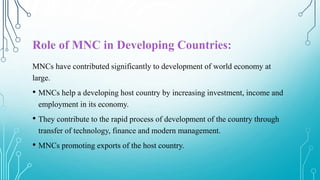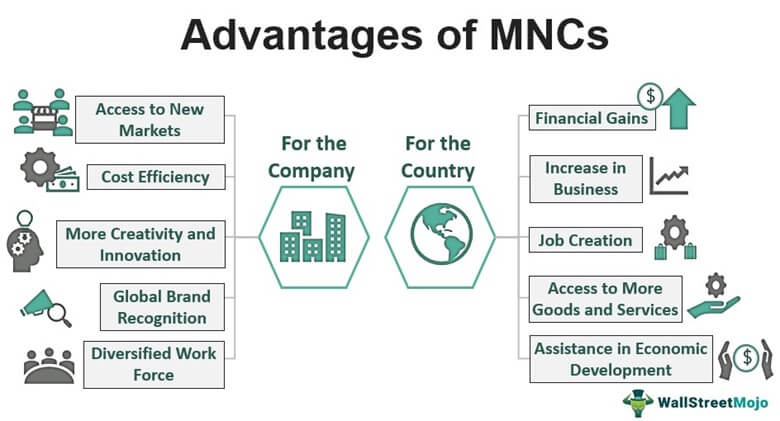Multinational corporations (MNCs) are companies that operate in multiple countries and have a global reach. These companies have the potential to significantly impact the economies and societies of developing countries, where they often invest and establish operations. There are various ways in which MNCs can contribute to the development of these countries, both directly and indirectly.
One way MNCs can contribute to the development of developing countries is by providing employment and income opportunities. MNCs often set up factories and other operations in these countries to take advantage of lower labor costs and other economic benefits. This can create jobs for local workers and provide a source of income for households. These employment opportunities can be especially important in developing countries where unemployment and poverty rates are high. In addition to providing income, MNCs can also help to improve working conditions and provide training and other benefits to their employees, which can contribute to their overall well-being and quality of life.
Another way MNCs can contribute to the development of developing countries is by investing in local infrastructure and facilities. MNCs may need to build roads, ports, and other infrastructure to support their operations, which can also benefit the local community. For example, the construction of a new road or port may improve access to transportation and markets, which can stimulate economic growth and development in the surrounding area. MNCs can also invest in education and healthcare facilities, which can help to improve the overall quality of life for local residents.
MNCs can also contribute to the development of developing countries through their involvement in various corporate social responsibility (CSR) initiatives. CSR refers to the efforts of companies to operate in an ethical and responsible manner and to contribute to the social and economic development of the communities in which they operate. MNCs may engage in various CSR activities such as supporting local charities and non-profit organizations, promoting education and training programs, and implementing environmental conservation efforts. These types of initiatives can help to address social and environmental issues in developing countries and contribute to their overall development.
In conclusion, multinational corporations can contribute to the development of developing countries in a variety of ways. By providing employment and income opportunities, investing in local infrastructure and facilities, and engaging in CSR initiatives, MNCs can have a positive impact on the economies and societies of these countries. It is important for MNCs to consider the potential long-term effects of their actions on the development of developing countries and to take a proactive approach to addressing the challenges and opportunities they present.
Multinational Company

Therefore, the overall standard of living will be improved. This structure creates efficiencies of scale that lower customer prices while still ensuring reasonably good product quality. Types of multinational companies There are four types of multinational companies: decentralised multinational corporations, global centralised corporations, international companies, and transnational enterprises: Fig. New technology and techniques that are being used by the multinational companies, as well as advanced knowledge, will be shared with local employees. Extensive depletion of the limited natural resources of some countries has been blamed on some large multinational corporations.
How Multinational Corporations Can Aid Development

What types of firms and from which countries are choosing to locate in developing countries? For example, BMW produce engines in Germany, import tyres from Asia and then have plants assembling cars in many different countries, such as the UK. List of the Advantages of Multinational Corporations 1. Foreign direct investment FDI and multinational corporations MNCs play a large and growing role in shaping our world, both economically and politically. In conclusion, despite the heavy scrutiny and occasional mishaps that occur, the overall impact of MNEs on developing countries is extremely positive. Giant corporations such as Adidas and Nike outsource their labor to take advantage of the low cost of labor in developing countries such as Vietnam, Bangladesh and Thailand.
Multinationals and growth in developing countries

Many multinational companies such as Starbucks, the Body Shop, and Microsoft, establish well-developed code of conduct; they also strive to achieve some social missions in order to do businesses ethically, minimize negative environmental impacts, raise public attention on certain issues, raise funds and donations,. Another example of an MNE that employs global standards is Coca-Cola. They rely on the resources of mature markets to maintain their supportive revenue streams. As a result, other players could face obstacles like overpricing, regulatory pricing or barriers to entry. Multinational corporations create one-way raw material resource consumption. In many cases, the payments have not effectively filtered through to the wider population — with money syphoned off by corrupt officials and politicians.
Multinational Corporations in Developing Countries

McDonald's also ranked 9th in the leading global firms, along with companies such as Apple, Facebook, and Amazon. Walmart offers a relentless push for profits. George Young, 20 Menu Items Only Found In European McDonald's, The Travel, 2018. MNCs continue to promote economic inequality in countries where they operate. The advantages and disadvantages of multinational corporations show us how the global economy tries to balance itself with their efforts. Not much has been researched on the nature of corruption in the private sector and indeed its preventability. The firm can employ specialists from across the globe.








